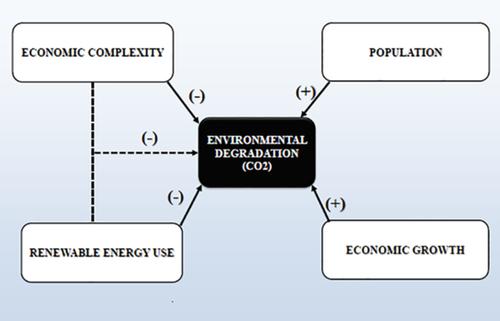当前位置:
X-MOL 学术
›
Sustainable Development
›
论文详情
Our official English website, www.x-mol.net, welcomes your
feedback! (Note: you will need to create a separate account there.)
The mitigating effects of economic complexity and renewable energy on carbon emissions in developed countries
Sustainable Development ( IF 9.9 ) Pub Date : 2020-09-09 , DOI: 10.1002/sd.2125 Buhari Doğan 1 , Oana M. Driha 2 , Daniel Balsalobre Lorente 3 , Umer Shahzad 4
Sustainable Development ( IF 9.9 ) Pub Date : 2020-09-09 , DOI: 10.1002/sd.2125 Buhari Doğan 1 , Oana M. Driha 2 , Daniel Balsalobre Lorente 3 , Umer Shahzad 4
Affiliation

|
Under the growing threats of climate change, innovation and pollution reduction have become driving forces for cleaner economic growth and the environment. This study endeavors to analyze the effect of economic complexity—understood as structural transformation toward more sophisticated and knowledge‐based production, economic progress, renewable energy consumption, and population growth over carbon emissions. Our study employs panel data for a sample of 28 OECD countries covering the period of 1990–2014. The main contribution to the energy economics literature is given by bringing together the concept of environmental degradation and economic complexity controlling via renewable energy consumption and economic and population growth. Based on the extensive empirical analysis (augmented mean group estimator, panel cointegration, and panel regression techniques), we conclude that economic complexity and renewable energy might help in mitigating the environmental degradation problems in OECD countries.
中文翻译:

经济复杂性和可再生能源对发达国家碳排放的缓解作用
在不断变化的气候变化威胁下,创新和减少污染已成为推动更清洁的经济增长和环境的动力。这项研究致力于分析经济复杂性的影响,这被理解为向更复杂和以知识为基础的生产,经济进步,可再生能源消耗以及人口因碳排放而增长的结构性转变。我们的研究采用了1990年至2014年期间28个经合组织国家样本的面板数据。对能源经济学文献的主要贡献是将环境退化和通过可再生能源消耗以及经济和人口增长来控制经济复杂性的概念结合在一起。根据广泛的经验分析(增强的均值群估计量,面板协整,
更新日期:2020-09-09
中文翻译:

经济复杂性和可再生能源对发达国家碳排放的缓解作用
在不断变化的气候变化威胁下,创新和减少污染已成为推动更清洁的经济增长和环境的动力。这项研究致力于分析经济复杂性的影响,这被理解为向更复杂和以知识为基础的生产,经济进步,可再生能源消耗以及人口因碳排放而增长的结构性转变。我们的研究采用了1990年至2014年期间28个经合组织国家样本的面板数据。对能源经济学文献的主要贡献是将环境退化和通过可再生能源消耗以及经济和人口增长来控制经济复杂性的概念结合在一起。根据广泛的经验分析(增强的均值群估计量,面板协整,











































 京公网安备 11010802027423号
京公网安备 11010802027423号